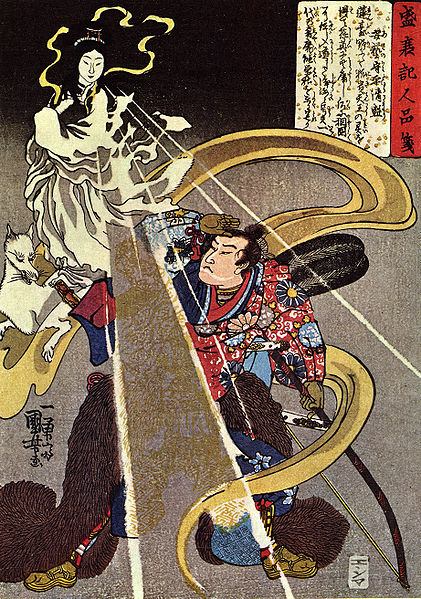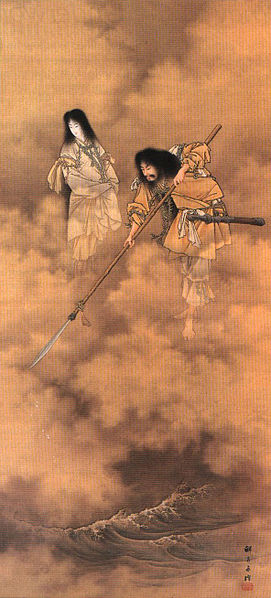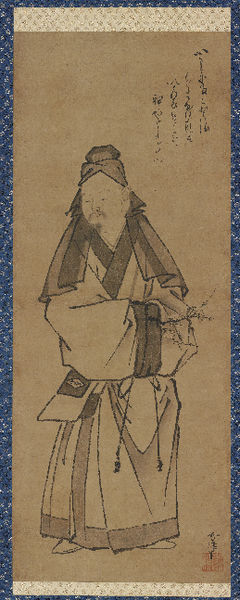
More of Japan’s Major Deities
 The Emperor of Japan is considered the direct descendant of Amaterasu, the goddess of the sun. Many Japanese myths are based on ancient texts such as the Kojiki and the Nihon Shoki. Japan has several gods or spirits, “kami” in Japanese. Japanese mythology embodies Shinto and Buddhist traditions and local folk religion that are deeply ingrained in the culture of the Japanese people.
The Emperor of Japan is considered the direct descendant of Amaterasu, the goddess of the sun. Many Japanese myths are based on ancient texts such as the Kojiki and the Nihon Shoki. Japan has several gods or spirits, “kami” in Japanese. Japanese mythology embodies Shinto and Buddhist traditions and local folk religion that are deeply ingrained in the culture of the Japanese people.
Depiction of an apparition of Inari Ōkami.
Here are more of the major deities in the Japanese religion:
Inari Ōkami – the goddess of fertility. She is considered to be the Japanese kami of foxes, of rice, tea, and sake, of general prosperity and worldly success, and of agriculture and industry. The initial worship of Inari Ōkami can be traced to the founding of the shrine at Inari Mountain in 711 CE, but some scholars believe it goes as far back as the 5th century. Inari Ōkami is also the patron of swordsmiths and merchants. She is a popular figure in both Buddhist and Shinto beliefs.
 Izanagi – “male-who-invites.” According to the Kojiki and the Nihon Shoki, Izanagi is a deity born of the seven divine generations in Japanese mythology and Shinto. He is known as the forefather of the gods. He is the very first male and the god of creation and life. He and his wife Izanami gave birth to the islands of Japan and several other kamis. Izanami died in childbirth and Izanagi failed to take her from the underworld. He is said to have fathered Amaterasu (goddess of the sun), Susanoo (god of storms), and Tsukuyomi (god of the moon).
Izanagi – “male-who-invites.” According to the Kojiki and the Nihon Shoki, Izanagi is a deity born of the seven divine generations in Japanese mythology and Shinto. He is known as the forefather of the gods. He is the very first male and the god of creation and life. He and his wife Izanami gave birth to the islands of Japan and several other kamis. Izanami died in childbirth and Izanagi failed to take her from the underworld. He is said to have fathered Amaterasu (goddess of the sun), Susanoo (god of storms), and Tsukuyomi (god of the moon).
Izanami-no-Mikoto – “she who invites.” She is the first female, and the goddess of both creation and death. She is the sister as well as the wife of Izanagi. A marital spat between herself and Izanagi is said to have been the cause of the cycle of life and death for all living beings.
Depiction of Izanagi and Izanami.
 Ryūjin – “dragon god.” He is the tutelary deity of the sea. Ryūjin was the father of the goddess Otohime who married the hunter prince Hoori. Emperor Jimmu, the first emperor of Japan, was the grandson of Otohime and Hoori. The Japanese imperial dynasty’s ancestors can be traced to Ryūjin.
Ryūjin – “dragon god.” He is the tutelary deity of the sea. Ryūjin was the father of the goddess Otohime who married the hunter prince Hoori. Emperor Jimmu, the first emperor of Japan, was the grandson of Otohime and Hoori. The Japanese imperial dynasty’s ancestors can be traced to Ryūjin.
Tenjin – “ god of scholarship.” His name before he became a deity was Sugawara no Michizane (845 – 903). He was a scholar, poet, and politician during the Heian Period. He was elevated to a deity after dying in exile; subsequent disasters ensued in Heian-kyō (now called Kyoto) whose causes are attributed to his angry spirit.
Depiction of Tenjin.
